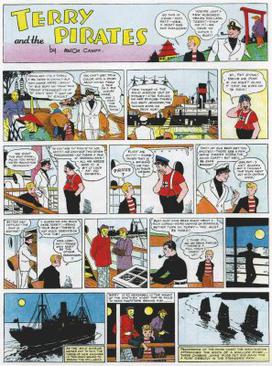
Terry and the Pirates is an action-adventure comic strip created by cartoonist Milton Caniff, which originally ran from October 22, 1934, to February 25, 1973. Captain Joseph Patterson, editor for the Chicago Tribune New York News Syndicate, had admired Caniff's work on the children's adventure strip Dickie Dare and hired him to create the new adventure strip, providing Caniff with the title and locale. The Dragon Lady leads the evil pirates; conflict with the pirates was diminished in priority when World War II started.

Burmese Days is the first novel by English writer George Orwell, published in 1934. Set in British Burma during the waning days of empire, when Burma was ruled from Delhi as part of British India, the novel serves as "a portrait of the dark side of the British Raj." At the centre of the novel is John Flory, "the lone and lacking individual trapped within a bigger system that is undermining the better side of human nature." The novel describes "both indigenous corruption and imperial bigotry" in a society where, "after all, natives were natives—interesting, no doubt, but finally...an inferior people".

Mandalay is the second-largest city in Myanmar, after Yangon. Located on the east bank of the Irrawaddy River, 631 km north of Yangon, the city has a population of 1,225,553.
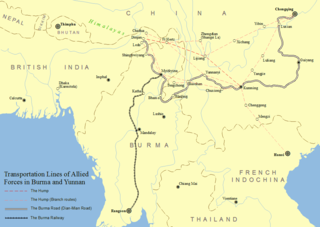
The Burma Road was a road linking Burma with southwest China. Its terminals were Lashio, Burma, in the south and Kunming, China, the capital of Yunnan province in the north. It was built in 1937–1938 while Burma was a British colony to convey supplies to China during the Second Sino-Japanese War. Preventing the flow of supplies on the road helped motivate the occupation of Burma by the Empire of Japan in 1942 during World War II. Use of the road was restored to the Allies in 1945 after the completion of the Ledo Road. Some parts of the old road are still visible today.

Lashio is the largest town in northern Shan State, Myanmar, about 200 kilometres (120 mi) north-east of Mandalay. It is situated on a low mountain spur overlooking the valley of the Yaw River. Loi Leng, the highest mountain of the Shan Hills, is located 45 km (28 mi) to the south-east of Lashio.
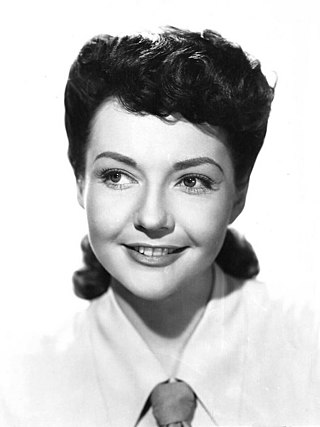
Lynn Bari was an American film actress who specialized in playing sultry, statuesque man-killers in roughly 150 films for 20th Century Fox, from the early 1930s through the 1940s.

The Black Bull of Norroway is a fairy tale from Scotland. A version titled The Black Bull of Norroway in the 1870 edition of Popular Rhymes of Scotland was reprinted in an Anglicised version by Joseph Jacobs in his 1894 book More English Fairy Tales.

"Mandalay" is a poem by Rudyard Kipling, written and published in 1890, and first collected in Barrack-Room Ballads, and Other Verses in 1892. The poem is set in colonial Burma, then part of British India. The protagonist is a Cockney working-class soldier, back in grey, restrictive London, recalling the time he felt free and had a Burmese girlfriend, now unattainably far away.
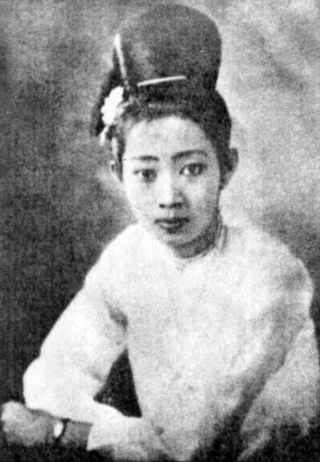
Ludu Daw Amar was a well known and respected leading dissident writer and journalist in Mandalay, Burma. She was married to fellow writer and journalist Ludu U Hla and was the mother of popular writer Nyi Pu Lay. She is best known for her outspoken anti-government views and radical left wing journalism besides her outstanding work on traditional Burmese arts, theatre, dance and music, and several works of translation from English, both fiction and non-fiction.
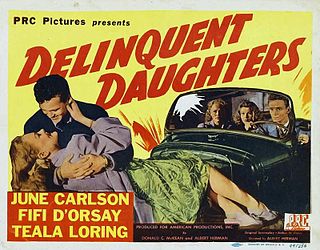
Delinquent Daughters, or Accent on Crime, is a 1944 American drama film directed by Albert Herman and starring June Carlson, Fifi D'Orsay and Margia Dean. An exploitation film, it is about a police investigation into the suicide death of a high school girl and the hard-partying teenagers at a party prior to the incident.
Bhagwandas Bagla was the first Marwari Shekhawati millionaire (crorepati). He was a very wealthy timber merchant and owned several Saw Mills. Bhagwandasji was originally from Churu, Rajasthan but proceeded his business to Burma and eventually settled in Rangoon. He proceeded his business to Burma during King Thibaw’s time. During the Anglo-Burmese War he became a big Military Supplier and Contractor, he built several roads, bridges etc. in Burma. He owned thousands of acres of Paddy lands facing Rangoon Harbour. He was a Banker, Landlord and Merchant, owned considerable properties in Rangoon, Mandalay, Moulmein and several other cities in Burma. He was awarded with the title of "Rai Bahadur" by the British Raj in February 1890.

The Road to Mandalay is a 1926 American silent drama film directed by Tod Browning and starring Lon Chaney, Owen Moore, and Lois Moran. It was written by Elliott Clawson, based on a story idea by Tod Browning and Herman Mankiewicz. The script's original shooting title was Singapore. The film took 28 days to complete at a cost of $209,000. The worldwide box office gross was $724,000. Some stills exist showing Chaney's makeup as Singapore Joe.

Tengchong is a county-level city of Baoshan City, western Yunnan province, People's Republic of China. It is well known for its volcanic activity. The city is named after the town of Tengchong which serves as its political center, previously known as Tengyue in Chinese. English language sources of the late nineteenth and early twentieth centuries use names such as Teng-Chung, Tingyueh, Teng Yueh, Momein and Momien.
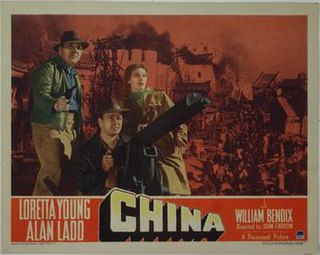
China is a 1943 film directed by John Farrow and starring Loretta Young, Alan Ladd and William Bendix. Ladd's character David Llewellyn Jones, wearing a fedora, a leather jacket, khakis and a beard stubble, was an inspiration for Indiana Jones. Aside from Tala Birell as one of Jones' paramours at the beginning of the film, the entire supporting cast is Asian, including Philip Ahn and Richard Loo.

China Doll is a 1958 romantic drama film set in the China Burma India Theater of World War II and starring Victor Mature and Li Li-Hua. It represented a return to films for director Frank Borzage who had taken a 10-year hiatus before tackling this poignant, yet "offbeat" film.

The Bangladesh, China, India and Myanmar Economic Corridor (BCIM) was a proposed corridor connecting India and China through Myanmar and Bangladesh as a corridor.

Women of All Nations is a 1931 American pre-Code military comedy film directed by Raoul Walsh and starring Victor McLaglen, Edmund Lowe, Greta Nissen and El Brendel. It was the second of three sequels to Walsh's 1926 film, What Price Glory?, with McLaglen and Lowe reprising their roles.
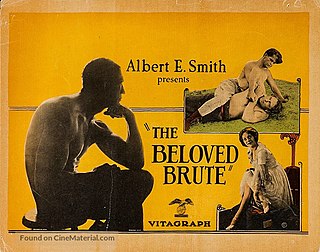
The Beloved Brute is a 1924 American silent Western film directed by J. Stuart Blackton and starring Marguerite De La Motte, Victor McLaglen, and William Russell. It is based on the 1923 novel The Beloved Brute by Kenneth Perkins. This was English-born McLaglen's first American film.
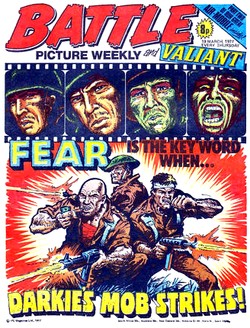
"Darkie's Mob" is a British comic war story published in the weekly anthology Battle Picture Weekly from 14 August 1976 to 18 June 1977 by IPC Magazines. Set during World War II, the story follows a rogue unit led by the uncompromising Joe Darkie, operating in Burma behind Japanese lines. Written by John Wagner and drawn by Mike Western, the strip was told through a bloodstained notebook recovered from the Burmese jungle in 1946.


















